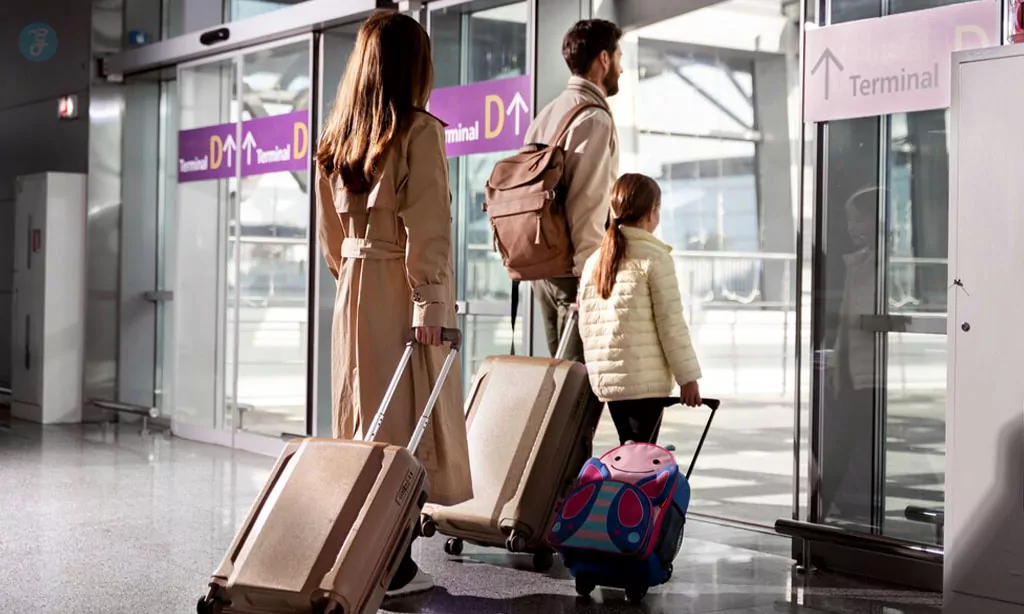Deciding how early should i get to the airport can be tricky. Many travelers wonder if they really need to arrive two hours before a domestic flight or three for an international one. The answers vary but knowing when to show up can ease stress and start your journey smoothly.
One key fact is that most airlines suggest arriving at least two hours ahead for domestic flights and three hours ahead for international ones. Our guide will explore what time should I arrive at the airport, including factors like TSA PreCheck and early morning flights.
Keep reading to make your next trip hassle-free. Ready? Let’s go!
Key Takeaways
- Aim to arrive at the airport two hours before domestic flights and three hours for international ones. This gives you enough time for all check-in and security procedures.
- Early morning flights still require arriving two or three hours early, depending on if they are domestic or international. This ensures smooth processing through check-in and security checks.
- Carrying a lot of luggage, traveling during peak seasons, or not being familiar with the airport layout can demand more arrival time at the airport.
- TSA PreCheck and Clear programs can speed up your security screening process. Enrolling in these services saves time, especially during busy travel times or for early flights.
- The size of the airport influences how early you should arrive. Larger airports often mean longer wait times for check-in and security, making it wise to stick to recommended arrival timelines.
How Early Should I Get to The Airport for Domestic Flights
To catch a domestic flight, aim to arrive at the airport two hours before your departure time. This allows you enough time for check-in, security screening, and boarding procedures.
Check-in procedures
Check-in procedures are crucial for your travel. Airlines usually require passengers to complete check-in at least two hours before a domestic flight and three hours prior for international ones.
During check-in, you provide your identification and confirm your flight details. Most airlines offer online check-in options, allowing you to skip some lines.
At the airport, drop-off locations help you hand over any luggage quickly. After checking in, proceed to security screening without delay. Early morning flights demand special attention; even if it feels early, aim for that two-hour arrival time.
This helps ensure a smooth travel experience while meeting all airport check-in requirements effectively.
Baggage drop-off
Baggage drop-off is an essential part of the airport check-in process. For domestic flights, most airlines recommend arriving at least two hours before departure. This allows ample time to handle your luggage properly.
You will need to check in your bags and receive a boarding pass. After completing this step, you can head to security screening.
International travelers should also arrive three hours early for their flights. The extra time ensures you have enough opportunity for customs procedures after baggage drop-off. Following these guidelines helps smooth out possible delays with your luggage so that you can enjoy a stress-free experience before your flight departs.
Security screening
Security screening plays a vital role in the airport arrival process. Expect to spend time passing through security checks at the airport. This step can take longer than anticipated, especially during peak travel hours.
Follow the instructions provided by TSA agents for a smoother experience.
Arriving two hours before your flight helps ensure you have enough time for security screening and other procedures. For international flights, it’s wise to arrive three hours early due to more extensive checks.
Keep in mind that arriving late may cause stress and even risk missing your flight.
Boarding time
Boarding time is an essential part of your airport experience. Airlines usually start boarding passengers 30 to 60 minutes before departure. For most flights, arriving early helps you find your gate and settle in without stress.
You will need time to navigate the airport check-in process and security checks.
For early morning flights, even if they leave at 6 a.m., arriving two hours early remains important. It allows ample time for check-in procedures and any unexpected delays. Following these guidelines ensures a smooth boarding process and prepares you for takeoff without rushing.
How Early to Arrive at the Airport for International Flights

Arrive at the airport at least three hours before your international flight to account for long check-in and security lines. Read more to ensure you have all the necessary information for a smooth journey.
Immigration procedures
Immigration procedures can take a significant amount of time, especially for international flights. It’s common for travelers to face long lines at passport control upon arrival.
Many countries require thorough checks before allowing entry. Generally, it is recommended to arrive at least three hours prior to your international flight departure time.
During immigration, expect officers to examine your documents carefully. They may ask about your travel plans and purpose of visit. Be prepared with all necessary paperwork ready, including visas if required.
Arriving early helps you navigate these processes smoothly and ensures that you do not miss your flight due to delays at the airport.
Customs procedures
Customs procedures can take time, especially for international flights. Travelers should plan to arrive at the airport at least three hours before their departure. This extra time allows for customs checks and sometimes lengthy lines.
Passengers need to present their passport and any required documentation during this process. Customs officers may ask questions about your travel plans or items you bring into the country.
Preparation helps make customs easier. Ensure all necessary paperwork is ready before reaching that point in the journey. Arriving early reduces stress and ensures you meet your flight on time without rushing through airport arrival procedures.
Factors That Can Affect Arrival Time at the Airport
Several elements can influence your arrival time at the airport. The amount of luggage you carry may slow down your check-in. The season and time of travel can also create longer lines.
If you hold TSA PreCheck or Clear, expect a quicker security process. Larger airports often pose more challenges than smaller ones due to crowded terminals. Knowing how to drop off passengers adds to convenience too.
Familiarity with the airport layout helps in navigating through it efficiently. Explore these factors further for a smoother flight experience!
Amount of luggage
Luggage can greatly impact your airport arrival time. If you carry a lot of bags, plan to arrive early. More luggage means longer check-in and baggage drop-off processes. Airlines suggest arriving at least two hours before domestic flights, even for early morning departures.
This timeframe gives you enough time to handle your bags without stress.
For international travel, extra luggage could complicate things further. Check-in lines may be longer, so arriving three hours in advance is wise. You want to make sure all procedures go smoothly before the flight’s departure.
Having more bags can slow you down during security screening too, so factor that into your plans as well.
Time and season of travel
Travelers must consider the time and season when planning their airport arrival. Busy travel seasons, like holidays or summer vacations, often lead to longer lines at check-in and security.
Arriving early becomes essential during these peak times. The general recommendation is to arrive two hours before domestic flights and three hours for international flights. This advice holds true even for early morning flights.
Early morning departures can be particularly challenging due to fewer staff available at that hour. Long wait times may occur due to a rise in travelers since many people take morning flights.
For international travel, arriving three hours early is crucial regardless of the season or time of day. These guidelines help ensure smooth processing through airport check-in requirements and security checks.
TSA PreCheck or Clear enrollment
TSA PreCheck and Clear enrollment can make airport experiences smoother. These programs help travelers get through security faster. With TSA PreCheck, passengers enjoy shorter lines at checkpoints.
This program allows you to leave on your shoes, belts, and light jackets. You also keep your laptop in the bag during screening.
Clear offers another level of convenience. It provides dedicated lanes for quicker passage through security checks. Members use a fingerprint or iris scan to verify their identity instantly.
Both options save time and reduce stress before flights. Enrolling in these services means better preparation for airport arrival times, especially during busy seasons or early morning flights.
Size of airport
The size of the airport plays a vital role in your early flight arrival time. Larger airports often have more passengers, which can lead to longer check-in and security wait times.
Since domestic flights require arriving at least two hours ahead of departure, this rule still applies even at busier airports. For international travel, aim for three hours early to allow extra time for immigration and customs procedures.
Smaller airports may offer quicker processing times. You might find that you can arrive just two hours before an international flight if the airport is not crowded. Regardless of the airport’s size, arriving earlier minimizes stress during the travel experience.
Consider all factors when determining your schedule on travel day to ensure a smooth journey through the airport check-in process.
Drop-off logistics
Drop-off logistics play a vital role in your airport arrival process. Arriving at least two hours before a domestic flight ensures smoother drop-off. It allows ample time for check-in, baggage drop-off, and security screening.
For international flights, arriving three hours early is key to handling immigration and customs procedures without stress.
Consider the size of the airport as well. Larger airports may have more complex drop-off areas, which can slow down your entry. Familiarity with the airport helps too; knowing where to go can save time.
Make sure your travel plans account for these factors to enhance your arrival experience and meet all airport check-in requirements efficiently.
Familiarity with the airport
Familiarity with the airport can greatly impact your travel experience. Travelers who know the layout of an airport often find it easier to navigate during busy times. They can quickly move from check-in to security and then to their gate.
This familiarity helps reduce stress, especially for early morning flights. For domestic flight check-in, arriving two hours ahead allows even those familiar with the airport enough time to complete all necessary steps without rushing.
For international travel arrival, being well-acquainted with the airport becomes even more crucial. Many travelers wonder about arriving just one hour before an international flight.
It is generally recommended to arrive at least three hours early due to immigration and customs procedures that may take longer than expected. Knowing where these processes are located within the airport can save valuable time and ensure a smoother travel experience overall.
Takeaways
Arriving early at the airport is key for a stress-free experience. For domestic flights, aim to get there two hours before departure. For international flights, plan for three hours ahead.
This time allows you to check in, drop off luggage, and pass through security smoothly. Following these recommendations helps ensure your trip starts on the right foot.
FAQs
1. What time should I arrive at the airport for early flights?
For domestic flight check-in, it’s best to arrive 2 hours before your flight departure. For international travel arrival time, aim for 3 hours ahead of your scheduled flight.
2. Are there different check-in requirements for domestic and international flights?
Yes, both have different airport check-in requirements. Domestic flights usually require passengers to be present 90 minutes before departure while international flights typically need a 3-hour advance arrival.
3. How does the airport security check affect my arrival time?
The airport security check can add extra time to your preflight preparations. If you have TSA PreCheck, this process is faster but still requires some buffer in your schedule.
4. Can you provide any early morning flight planning tips?
Sure! Always consider traffic conditions when planning your trip to the airport for an early morning flight check-in and follow the recommended airport arrival guidelines.
5. Does having an early morning flight change my usual pre-flight routine?
Yes! Early morning flights often mean less crowd at the airports but also limited services available like food or shops being open so plan accordingly with these factors in mind.





























